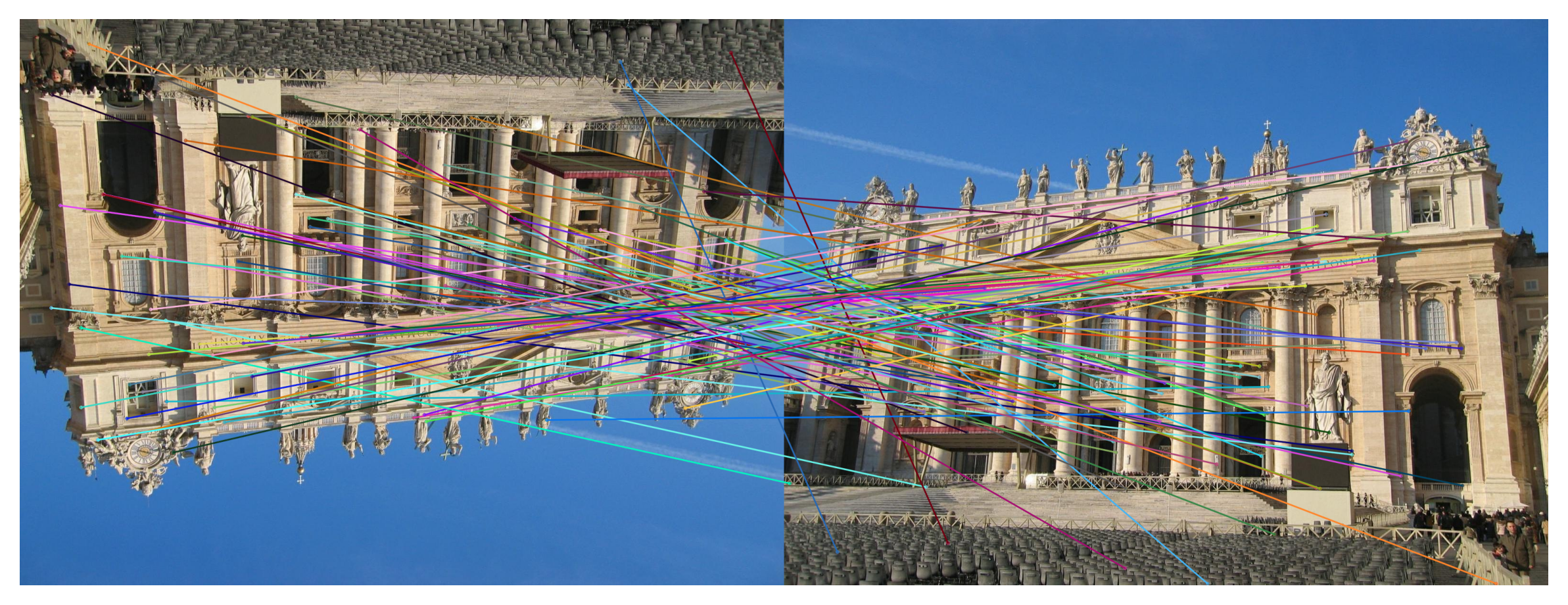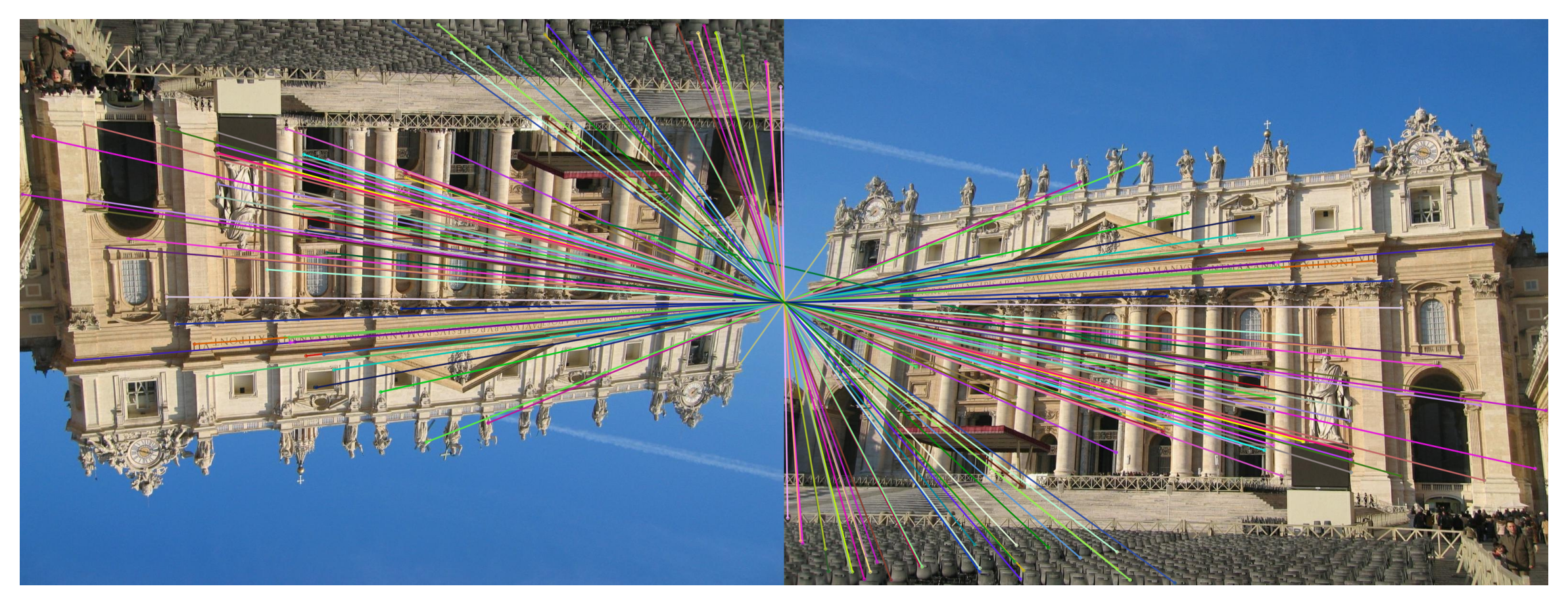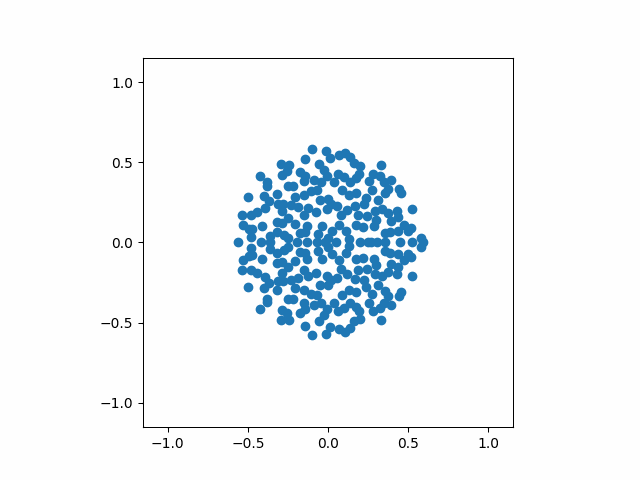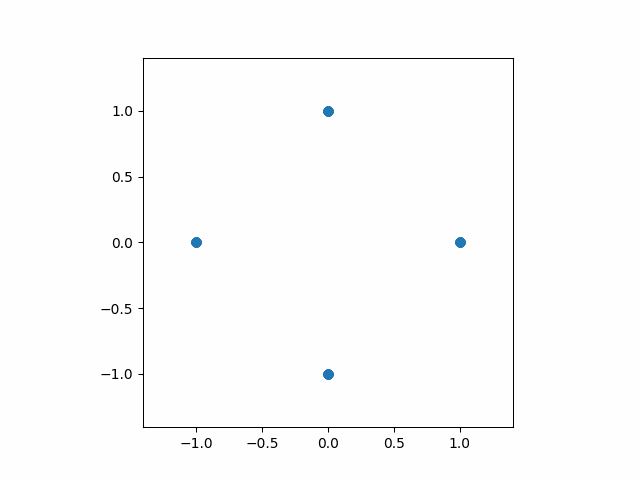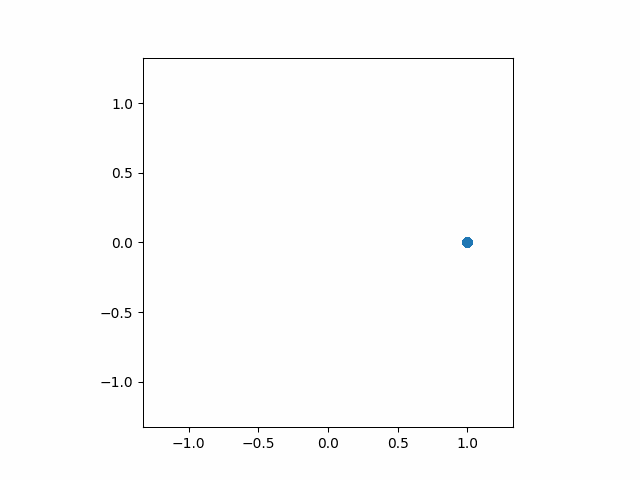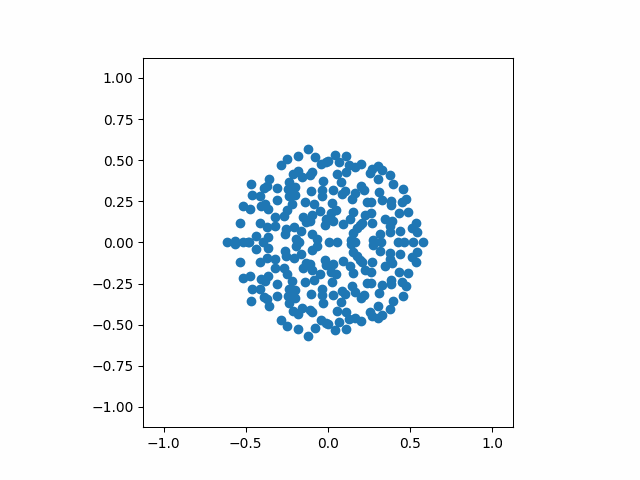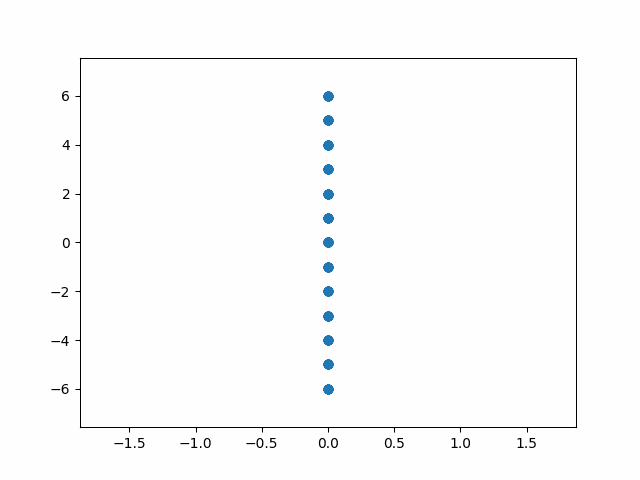Georg Bökman, Johan Edstedt, Michael Felsberg, Fredrik Kahl
Oral presentation @ CVPR 2024
A steerer for D-dimensional keypoint descriptions is a DxD matrix that transforms the descriptions as if they were computed from a rotated image. More info below.
For running the code, create a new virtual environment of your preference (e.g. conda) with python>=3.9, jupyter notebook and GPU-enabled PyTorch.
Clone this repository with DeDoDe as submodule (git clone --recursive-submodules git@github.com:georg-bn/rotation-steerers.git).
Then install using bash setup.sh.
The weights are uploaded to releases. To download model weights needed for the demo and put them in a new folder model_weights, run
bash download_weights.sh
Matching example using a steerer:
from PIL import Image
from DeDoDe import dedode_detector_L, dedode_descriptor_B
from rotation_steerers.steerers import DiscreteSteerer, ContinuousSteerer
from rotation_steerers.matchers.max_similarity import MaxSimilarityMatcher, ContinuousMaxSimilarityMatcher
im_A_path = "example_images/im_A_rot.jpg"
im_B_path = "example_images/im_B.jpg"
im_A = Image.open(im_A_path)
im_B = Image.open(im_B_path)
w_A, h_A = im_A.size
w_B, h_B = im_B.size
# Detection of keypoints (as for ordinary DeDoDe)
detector = dedode_detector_L(weights=torch.load("model_weights/dedode_detector_L.pth"))
detections_A = detector.detect_from_path(im_A_path, num_keypoints = 10_000)
keypoints_A, P_A = detections_A["keypoints"], detections_A["confidence"]
detections_B = detector.detect_from_path(im_B_path, num_keypoints = 10_000)
keypoints_B, P_B = detections_B["keypoints"], detections_B["confidence"]
# We show three example matching strategies here (comment/uncomment as required)
# C4-steering
descriptor = dedode_descriptor_B(weights=torch.load("model_weights/B_C4_Perm_descriptor_setting_C.pth"))
steerer = DiscreteSteerer(generator=torch.load("model_weights/B_C4_Perm_steerer_setting_C.pth"))
matcher = MaxSimilarityMatcher(steerer=steerer, steerer_order=4)
# # C8-steering with discretized steerer (recommended)
# descriptor = dedode_descriptor_B(weights=torch.load("model_weights/B_SO2_Spread_descriptor_setting_B.pth"))
# steerer_order = 8
# steerer = DiscreteSteerer(
# generator=torch.matrix_exp(
# (2 * 3.14159 / steerer_order)
# * torch.load("model_weights/B_SO2_Spread_steerer_setting_B.pth")
# )
# )
# matcher = MaxSimilarityMatcher(steerer=steerer, steerer_order=steerer_order)
# # SO(2)-steering with arbitrary angles (not recommended, but fun)
# descriptor = dedode_descriptor_B(weights=torch.load("model_weights/B_SO2_Spread_descriptor_setting_B.pth"))
# steerer = ContinuousSteerer(generator=torch.load("model_weights/B_SO2_Spread_steerer_setting_B.pth"))
# matcher = ContinuousMaxSimilarityMatcher(steerer=steerer, angles=[0.2, 1.2879, 3.14])
# Describe keypoints and match descriptions (API as in DeDoDe)
descriptions_A = descriptor.describe_keypoints_from_path(im_A_path, keypoints_A)["descriptions"]
descriptions_B = descriptor.describe_keypoints_from_path(im_B_path, keypoints_B)["descriptions"]
matches_A, matches_B, batch_ids = matcher.match(
keypoints_A, descriptions_A,
keypoints_B, descriptions_B,
P_A = P_A, P_B = P_B,
normalize = True, inv_temp=20, threshold = 0.01
)
matches_A, matches_B = matcher.to_pixel_coords(
matches_A, matches_B,
h_A, w_A, h_B, w_B,
)See the example notebook demo.ipynb for more simple matching examples.
Follow the instructions from DeDoDe to get the data and annotations set up. Representative experiments are present in the experiments folder.
A steerer is a linear map that modifies keypoint descriptions as if they were obtained from a rotated image. So a steerer makes the keypoint descriptor equivariant. This provides a computational shortcut as we don't have to rerun our descriptor for every rotation of the image. Below we show matches from original DeDoDe descriptions, and DeDoDe descriptions multiplied by a steerer:
Hence, steerers are useful practically. But they are also interesting conceptually: Steerers can be found for arbitrary given descriptors, even such that are trained without any rotation augmentation (we explain why in the paper). Further, steerers can be trained jointly with a descriptor, enabling rotation augmentation without degrading performance on upright images (we get interesting training dynamics, see below and Section 5.5 of the paper). Similarly we can fix a steerer and train a descriptor given the steerer. All these three settings are explored in our paper.
We consider steerers for the group C4 of quarter turn rotations as well as the full rotation group SO(2). The first case is useful practically to align images upright and the second for completely rotation invariant matching.
Here we provide the gif version of Figure 4 in the paper. We show how the eigenvalues of the steerer evolve in the complex plane during training when we train the steerer and descriptor jointly. The first three correspond to a C4-steerer and the last two show the Lie algebra generator of an SO(2)-steerer.
@article{bokman2023steerers,
title={{Steerers: A framework for rotation equivariant keypoint descriptors}},
author={Georg B{\"o}kman and Johan Edstedt and Michael Felsberg and Fredrik Kahl},
year={2023},
eprint={2312.02152},
archivePrefix={arXiv},
primaryClass={cs.CV}
}Our code has an MIT license. DeDoDe-G uses a DINOv2 backbone which has an Apache-2 license.

